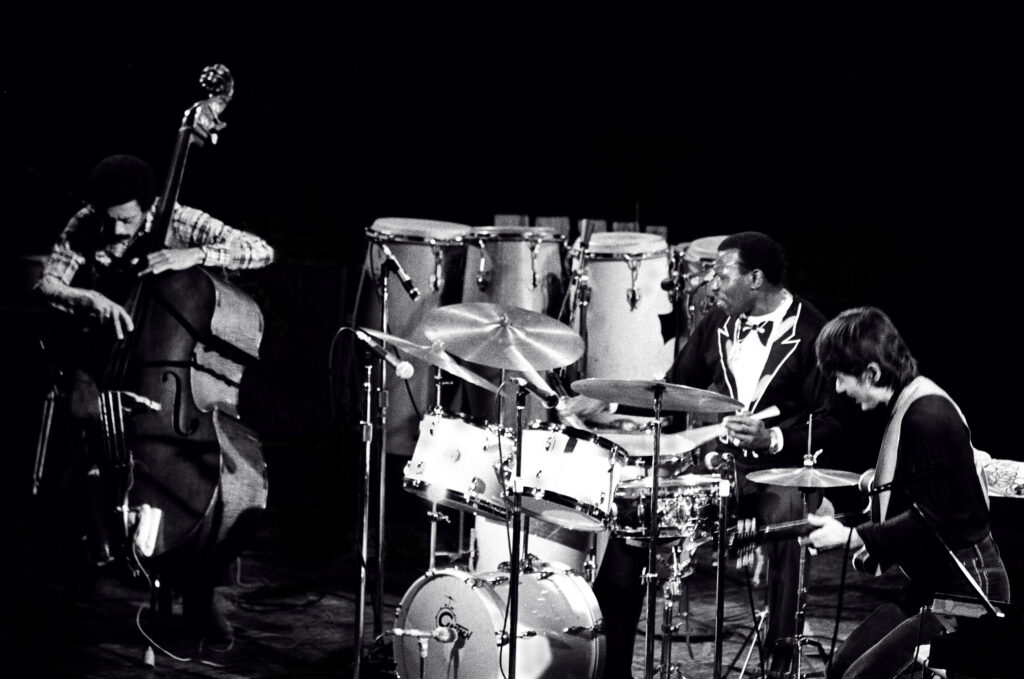
The Elvin Jones Trio in 2007, with David Williams on bass, left, and Ryo Kawasaki on guitar at right. (Photo by Tom Marcello via Flickr under terms of CC BY-SA 2 at https://creativecommons.org/licenses/by-sa/2.0/)
On this day (September 9), 94 years ago, jazz drummer Elvin Jones was born in Pontiac, Michigan, to a musical family. He cut his teeth as a professional musician in post-WWII Detroit, a hothouse of great Black musicians that included his brothers, Thad, a cornetist, who went to considerable fame as co-leader of a big band with drummer Mel Lewis, and Hank, a pianist, who became one of the leading stylists of mainstream modern jazz piano that blended Teddy Wilson and Earl Hines with Bop voicings. Elvin, of course, became known as a member of the famous John Coltrane quartet of the 1960s that included pianist McCoy Tyner, bassist Jimmy Garrison, and Coltrane on tenor and soprano saxophones. The group changed jazz, ushered in the age of the avant-garde or Free Jazz, along with saxophonists Ornette Coleman, Archie Shepp, and Albert Ayler, pianists Cecil Taylor and Andrew Hill, and bandleader Sun Ra. They were heady days for jazz, when anything seemed possible.
In the 1960s, it was Jones and Buddy Rich who ran neck-and-neck in the readers’ polls for the best jazz drummer. And it was also in the pages of Downbeat where Jones dismissed British rock drummer Ginger Baker. (Musicians say nastier things about each other than any critic could.) I remember in 1976, the brilliant, somewhat New Age-y jazz group, Oregon, recorded an album with Jones called Together, which indicated what a big deal the meeting of seeming opposites was: when White jazz meets Black jazz, although I think it was the avant-garde, free improvisational element that brought them together and that made the encounter make sense. It was probably the hardest driving record Oregon ever made.
In 1972 or 1973, when I was twenty years old and a college undergraduate, I interviewed Jones at a Philly jazz club. I cannot remember which one, but I know it was not the Aqua Lounge or Just Jazz. It was not on the University of Pennsylvania’s campus either, where jazz groups sometimes played. What I remember was that I had to finagle to get in without paying. I was doing the interview for my college newspaper which, of course, no one ever heard of. At the time, Jones’s group was the same that was featured on the album, Live at the Lighthouse, two saxophones, bass, and drums. The songs were long. The solos exuberant. The entire performance could be called, for lack of a better word, athletic. One marveled at the musicians’ stamina as much as their inventiveness. Jones took some of the longest drum solos I ever heard. Despite the moments when the music seemed almost to wear you out, there was something monumental and thrilling about it, something that made you glad to be alive. It was better than hearing the band on record, but this is true with virtually any music.
I could not interview him after the first set. He told me to talk to him after the second set. It was pretty late when I approached him again. He was sitting with some friends, fans, whatever, drinking, and trying to make time with a woman who seemed interested in his interest. He had completely forgotten about me and was certainly not interested in doing the interview. He blew me off. The woman saved the day for me. She told me, “Aww, come on. Help the kid out. Help out the working press. The kid’s trying to show some initiative.” So, Jones agreed to the interview, simply to please the woman. I set up my recorder and started asking my questions. Some people came over and distracted Jones for a few minutes. I turned off the recorder until I got his attention again. Alas, when I got his attention again, I forgot to turn on the recorder. I finished my questions and felt satisfied with the interview when I realized to my horror that 75 percent of it had not been recorded.
“I forgot to turn my recorder back on,” I cried. I was actually nearly in tears.
I will never forget what Jones said, “That’s all right, kid. Just make it up. That’s what all the jazz writers do.” I was horrified by what he said. “I would never do that,” I said earnestly. He simply laughed.
The woman felt bad for me and got Jones to stay a little longer to answer a few questions again, once I turned the recorder back on, but he was perfunctory and impatient at this point. I could not blame him. He had given me the interview. It was not his concern that I was too inexperienced to know whether my recorder was on or off.
I do not remember if I ever wrote up what I had. Perhaps I did. I know that I did not make anything up. Years later when I told my daughters this story, they thought it pretty funny. They were never interested in what I remembered of what Jones said in the interview.
